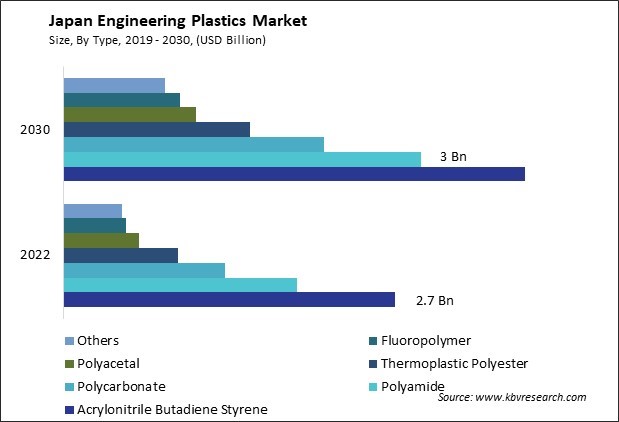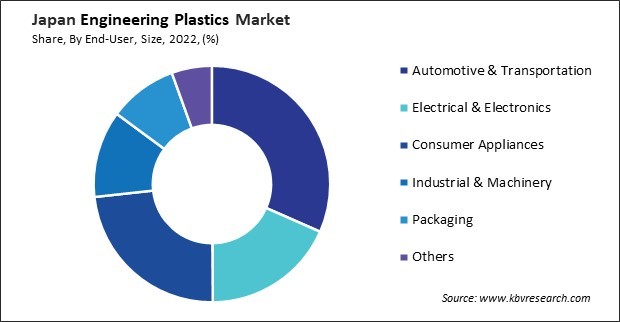The Japan Engineering Plastics Market size is expected to reach $13.4 Billion by 2030, rising at a market growth of 5.2% CAGR during the forecast period. In the year 2022, the market attained a volume of 3,203.0 Kilo Tonnes, experiencing a growth of 2.7% (2019-2022).
The engineering plastics market in Japan has witnessed significant growth and development over the past few decades, propelled by advancements in technology, increasing demand from various end-use industries, and a strong emphasis on innovation and sustainability. One of the key drivers of the engineering plastics market in Japan is the automotive industry. Japan is renowned for its automotive manufacturing prowess, with leading companies such as Toyota, Honda, and Nissan dominating the global industry. The lightweight nature, durability, and design flexibility of engineering plastics have contributed to their widespread adoption in the automotive sector, driving the demand for these materials in Japan.

Additionally, the electronics and electrical industry represents another significant industry in Japan for engineering plastics. With the country being a hub for technology and electronics manufacturing, there is a constant need for high-performance materials that withstand the rigors of electronic devices and components. Engineering plastics offer excellent electrical insulation properties, heat resistance, and dimensional stability, making them indispensable in connectors, switches, housings, and insulating materials.
Furthermore, the construction and infrastructure sectors also contribute to Japan's demand for engineering plastics. These materials find applications in various construction-related products, including pipes and fittings, roofing materials, insulation panels, and structural components. The growing focus on sustainable building practices and energy efficiency has further boosted the adoption of engineering plastics in construction applications, as they offer recyclability, durability, and energy-saving characteristics.
The medical and healthcare industry is another emerging industry for engineering plastics in Japan. With an aging population and increasing healthcare expenditures, there is a growing demand for advanced medical devices, diagnostic equipment, and pharmaceutical packaging. According to the International Trade Administration, the proportion of the population older than 65 will rise from 29% to 40 % by 2060.
However, the COVID-19 pandemic has had a significant impact on the engineering plastics market in Japan. While the initial disruptions in supply chains and production activities affected the engineering plastics market negatively, the pandemic also underscored the importance of engineering plastics in healthcare and medical applications. The demand for medical devices, personal protective equipment (PPE), and packaging materials surged during the pandemic, driving the need for high-performance plastics with antimicrobial properties, chemical resistance, and ease of sterilization.
The engineering plastics market in Japan is experiencing a notable surge in demand, driven primarily by the increasing need for medical devices. One significant driver of this demand is the continuous innovation in medical device technology. According to the International Trade Administration, the medical devices industry in Japan achieved a significant milestone in 2021, reaching a total value of $40 billion. As research and development efforts progress, engineers are constantly introducing new and improved medical devices designed to enhance patient care, improve treatment outcomes, and increase efficiency in healthcare delivery.
Moreover, the ongoing advancements in medical technology have fueled the demand for engineering plastics in Japan. With continuous developments in minimally invasive surgery, diagnostic imaging, and drug delivery systems, there is a growing need for materials that withstand the rigors of these cutting-edge technologies while maintaining precision and reliability. With their superior mechanical properties and biocompatibility, engineering plastics have emerged as a preferred choice for many medical device manufacturers in Japan, seeking to meet these stringent requirements.
Furthermore, Japan's regulatory landscape has played a crucial role in driving the adoption of engineering plastics in the healthcare sector. The government's stringent safety standards and quality regulations have incentivized manufacturers to invest in materials that not only meet but exceed these standards. Hence, the intersection of innovative medical device technology, advancing medical practices, and rigorous regulatory standards has propelled the demand for engineering plastics in Japan's healthcare sector to unprecedented heights.
In recent years, Japan has witnessed a notable surge in adopting thermoplastic polyesters within the engineering plastics market. One primary driver of this trend is the growing emphasis on sustainability and environmental consciousness in Japan's manufacturing sector. Thermoplastic polyesters, such as polyethylene terephthalate (PET) and polybutylene terephthalate (PBT), are renowned for their recyclability and low environmental impact compared to traditional plastics. As Japanese industries strive to meet stringent environmental regulations and consumer demands for eco-friendly products, adopting thermoplastic polyesters aligns with these sustainability goals.
Another contributing factor to the rising adoption of thermoplastic polyesters is the ongoing technological advancements and innovations in polymer processing techniques. Manufacturers in Japan are increasingly leveraging advanced molding technologies, such as injection molding and extrusion, to produce complex parts and components from thermoplastic polyesters with enhanced precision and efficiency.
Moreover, Japan's robust supply chain and infrastructure for thermoplastic polyesters further support their widespread adoption in the engineering plastics market. Domestic producers and suppliers ensure reliable access to high-quality raw materials, compounded resins, and finished products, fostering a conducive environment for manufacturers to seamlessly incorporate thermoplastic polyesters into their production processes. Thus, Japan's adoption of thermoplastic polyesters in the engineering plastics market reflects a strategic alignment with sustainability goals, driven by technological advancements and supported by a robust supply chain infrastructure.

In Japan, the engineering plastics market is a vital segment of the country's manufacturing industry, serving diverse sectors such as automotive, electronics, construction, and healthcare. One of the most prominent Japanese engineering plastics market companies is Mitsubishi Engineering-Plastics Corporation (MEP). MEP offers a wide range of high-performance materials, including polybutylene terephthalate (PBT), polyphenylene sulfide (PPS), and polycarbonate (PC). These materials are used in automotive components, electrical connectors, electronic devices, and household appliances. MEP's expertise in polymer technology and its focus on customer-centric solutions have solidified its position as a leading supplier in the Japanese industry.
Teijin Limited is also a notable participant in the Japanese engineering plastics market, offering a diverse portfolio of materials under brands like Panlite polycarbonate, Tenax carbon fiber, and Vayu thermoplastic composites. These materials are utilized in automotive glazing, aircraft interiors, electronic enclosures, and sporting goods. Teijin's focus on sustainability and advanced manufacturing processes underscores its dedication to providing environmentally friendly solutions to its customers.
Another major player is Toray Industries, Inc., a diversified chemical company with a significant presence in the engineering plastics sector. Toray produces advanced materials such as Torayca carbon fiber-reinforced plastics, Lumirror polyester film, and Toyolac acrylonitrile butadiene styrene (ABS) resin. These materials find applications in automotive lightweighting, aerospace structures, packaging, and consumer electronics. Toray's commitment to research and development drives continuous innovation, ensuring its products meet the stringent requirements of modern industries.
Sumitomo Chemical Company Limited is also a key contributor to the Japanese engineering plastics industry, offering a diverse range of materials including SumikaExcel polypropylene, Sumilite polyphenylene sulfide (PPS), and Sumitomo Bakelite phenolic resins. These materials are utilized in automotive interiors, electrical connectors, semiconductor packaging, and medical devices. Sumitomo Chemical's extensive research capabilities and focus on customer collaboration enable it to develop tailored solutions to meet specific application requirements.
Furthermore, companies like Asahi Kasei Corporation, Sekisui Chemical Co., Ltd., and Kuraray Co., Ltd. play significant roles in the Japanese engineering plastics market, offering specialized materials and innovative solutions for various industries. Japanese companies continue to lead the way in developing advanced materials that meet the evolving needs of global industries while contributing to the country's reputation as a center of excellence in manufacturing and technology.
By Type
By End-User
Our team of dedicated experts can provide you with attractive expansion opportunities for your business.

